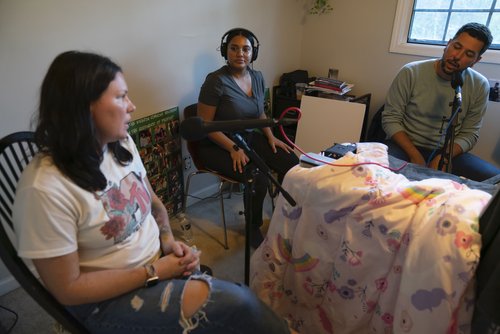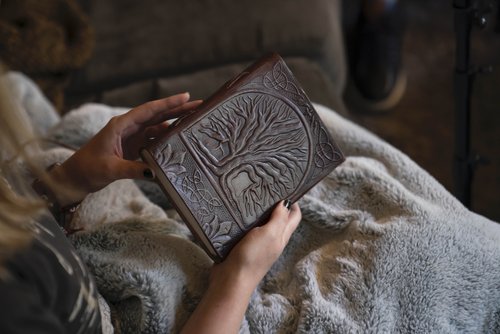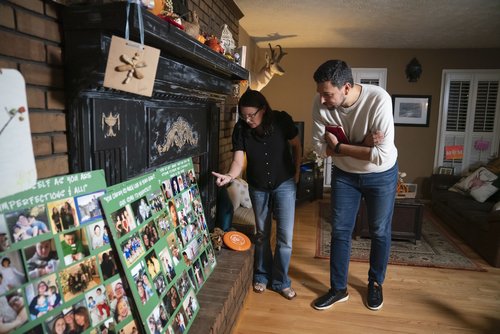NBCU Academy Presents “Behind the Story”
After the Jan. 6 insurrection, MSNBC anchor Ayman Mohyeldin received a Facebook message from an old high school friend from Kennesaw, Georgia. The friend was asking whether Ayman would tell the story of a woman who died in the crush of the mob, steps away from a door of the U.S. Capitol. The woman was the friend’s sister-in-law, Rosanne Boyland, who died at age 34.
“My wife and I believe she was radicalized… inside of 6 months,” he messaged Ayman.

The MSNBC anchor, along with producer Preeti Varathan, spent months investigating Boyland’s increasing obsession with QAnon conspiracy theories and interviewing members of her family to piece together the last months of her life.
The resulting five-part podcast, MSNBC’s “American Radical,” explores how internet conspiracy theories can brainwash a person like Boyland to participate and die in a riot intended to overthrow the 2020 presidential election.
Preeti and Ayman sat down to discuss the making of the podcast. You can watch the video above and read more of their extended Behind the Story conversation below. The discussion has been lightly edited for length and clarity.
The parallels to covering terrorism abroad and radicalism at home
Preeti Varathan: You have this really deep reporting background and covering radicalism and terrorism around the world, especially in the Middle East. And then, you were looking at a story from your own hometown in America. What was it like applying your international beat to your own hometown in Georgia?
Ayman Mohyeldin: I’d never thought that what I had spent 15 years or so overseas covering – radicalism and extremism and terrorism – would somehow bring me back to Kennesaw. I moved to Kennesaw in the early ’90s; I was in high school. I grew up in Kennesaw in a very different time than what I had come back to when we were reporting this story.
In my years overseas covering extremism and terrorism, what was fascinating was going beyond the headlines of an attack to try to understand what led the perpetrator to this moment in their life, trying to understand from speaking to their family and associates. How does somebody go from being person X to a foot soldier willing to commit an attack for an ideology?

I saw a pattern that I had seen repeatedly. To some extent they were down on their luck. They had personal problems and challenges. They were consumed with disinformation and the belief that only if they did x, they could turn change their life around; if they belong to this movement, whether it’s ISIS overseas or QAnon, they form a belief that their new network gives them new meaning and purpose.
And then you had the presence of a demagogue. In this case, it was Donald Trump, who said, I alone could fix it, follow me, follow me to the steps of the Capitol or come to stop this deal. It’s the same demagoguery that we hear from extremist leaders overseas, whether it’s the leader of ISIS or other terrorist groups who promised young recruits a new lease on life. They can promise you paradise, that they can save your freedoms and your country.
I never would have thought that a place like Kennesaw would have the same forces affecting the lives of young people like Rosanne.
What happens when you can’t track down a source?
Mohyeldin: There was one voice we had been trying to desperately talk to – Justin Winchell, who had gone up there with her from Georgia. He was this mysterious figure in her life.
You spent a lot of time trying to chase him down. From a journalistic standpoint, tell us about how one goes about trying to find someone like that and ultimately if you can’t, when do you decide it’s time to move on?

Varathan: Yeah, Justin Winchell is our mystery man at large in this series. Our team spent many months trying to track him down. I think there were many moments in trying to find Justin that I felt less like a journalist and more like a P.I.
We at NBC have access to amazing legal databases, so I was able to find some of his financial records and figure out his last known addresses and where he most likely worked. I found his LinkedIn. I think people think journalism is this mysterious, opaque thing, and at times, it really can be, but a lot of times it’s like “Facebook stalking.” And sometimes that’s where you begin.
There is a line between dogged reporting and finding someone, then wondering if you’re bordering on harassment. Near the end of our reporting, I was confident that Justin Winchell knew that Preeti Varathan at NBC wanted to get in touch with him.
This person knew that I wanted to find him. It never meant that we gave up. At some point, you’ve done all your due diligence, the series is about to come out. And you’re like, “OK we’ve literally tried every single avenue we can.” And I will admit some part of me is still trying to look for Justin Winchell. The series is out, and it’s done and it’s fine, but you don’t ever give up.
Mohyeldin: The bonus episode [laughs].
Varathan: [laughs] Yeah, seriously. If we find Justin Winchell that’ll be the bonus episode.



